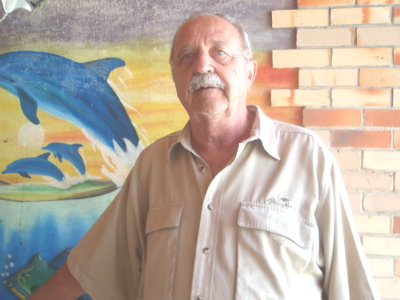 Meet René Schaerer, a Swiss born social entrepreneur and innovator promoting sustainable living on the coast of Brazil through viable economic activities, civic engagement and participation of small-scale fisherfolk.
Meet René Schaerer, a Swiss born social entrepreneur and innovator promoting sustainable living on the coast of Brazil through viable economic activities, civic engagement and participation of small-scale fisherfolk.
René Schaerer was born in Bern, Switzerland, in 1941. He joined Swissair (Swiss national airline) in 1961 and pursued his career in the company for 31 years with postings in the USA, Italy, Spain and Brazil. At the age of 51 he made a life choice and moved to the fishing village of Prainha do Canto Verde in 1992. René is co-founder of the Terramar Institute and the community tourism network. He is a member of the International Collective in Support of Fish Workers (ICSF) with head office in Chennai, India. He is also a Fellow of Ashoka and the initiator of the Philanthropic Association Friends of Prainha do Canto Verde in Switzerland. René has published over 20 articles and presented at 10 international events and congresses. René often consults with daughter Michelle who holds a PhD in marine bioloy at the University of Puerto Rico. He lives with his wife Marly in the Marine Extractive Reserve of Prainha do Canto Verde. He can be contacted by e-mail at <Diese E-Mail-Adresse ist vor Spambots geschützt! Zur Anzeige muss JavaScript eingeschaltet sein!>.
René granted Mundus maris the following interview
MM:: Would you please explain your current job and why you care so much about fishers and the ocean?
RS: It´s not a job, it´s a mission. When I quit my job and moved to Prainha do Canto Verde in the northeast of Brazil I was looking for a new challenge. Developing fisheries and promote community development for the population of 1000 souls became a passion and soon led to conflicts with real estate speculators. It was also an apprenticeship in fisheries and a struggle to help the fishers participate in the management of their own fishery and the once plentiful spiny rock lobsters resource. With the fishers we learn that with small steps and change in behaviour we can contribute to preserve and even rebuild ocean resources.
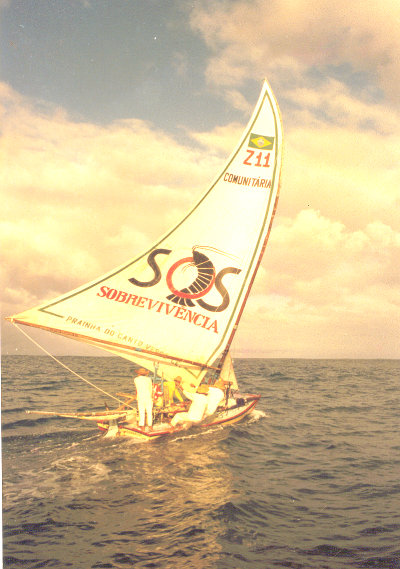 Twentythree years ago, fishers were totally dependent on intermediaries for fishing gear, bait and ice. They sold fish and lobster at low prices. This has changed and fishers now own their boats and gear. They sell at market prices to native fishmongers who fulfill the role of the intermediaries.
Twentythree years ago, fishers were totally dependent on intermediaries for fishing gear, bait and ice. They sold fish and lobster at low prices. This has changed and fishers now own their boats and gear. They sell at market prices to native fishmongers who fulfill the role of the intermediaries.
With the help of a microcredit fund, fishers had started to make their own lobster traps and fishing nets. The philanthropic Association “Amigos da Prainha do Canto Verde” in Switzerland has made many of the changes possible.
But the lobster fishery suffered from predatory and illegal fishing by divers on compressor boats who challenged the artisanal fishers from the 574 km coast of the state of Ceará. Fishers were also ignored by authorities and had no participation in the management of the fishery.
On April 4, 1993 four fishers on a jangada (typical sail raft) sailed to Rio de Janeiro to protest against illegal fishing, real estate speculation and the development of mass tourism, which was grabbing the community´s valuable land. They were accompanied by two women who provided logistics and communication along the journey. Fishers wanted to have a say in public policies along the coast.
At the end of the journey the NGO Instituto Terrramar was founded in Fortaleza and started to work for the holistic development of coastal communities. Two years later, the State Government of Ceará challenged the fisheries sector and federal government by inviting fishers to participate of the first State Fisheries Management Committee created in the country.
The result of this partnership was the first national lobster management plan approved in Brasilia in 1996. Fishers too got organised and created the Fisher Forum of Ceará. They invited NGOs and civil society to intervene in coastal development against real estate speculation coordinated by Terramar.
The Forum for the defense of the Coastal Zone FODZCC allied with Federal Attorneys and the Federal Environment Agency IBAMA and was successful in stopping the advance of tourist resorts along the coast of Ceará. Prainha do Canto Verde was the first community along the coast of Brazil to introduce a more sustainable form of tourism, called Community Based Tourism (CBT). Communities promote and develop their own tourism business as owners and not as low paid labourers.
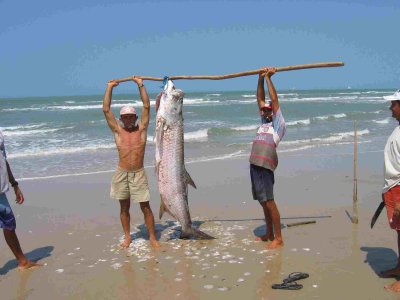 More important, CBT is an important tool against landgrabbing, creating incentives for the communities' land struggles. Future generations may become fishers or not, but they will always have their own land and opportunities to generate income fromn new technology or service jobs and small business. Today 15 communities along the coast are forming a community tourism networks called “rede TUCUM”. They are working with communities all over Brazil to create the national community tourism network TURISOL.
More important, CBT is an important tool against landgrabbing, creating incentives for the communities' land struggles. Future generations may become fishers or not, but they will always have their own land and opportunities to generate income fromn new technology or service jobs and small business. Today 15 communities along the coast are forming a community tourism networks called “rede TUCUM”. They are working with communities all over Brazil to create the national community tourism network TURISOL.
MM: What do you consider as the two most serious threats to the oceans, marine life and marine ecosystems?
RS: First, Migration and population growth on the coast, due to desertification in the interior of the Northeast which will bring landless people to the coastal region. Second, overfishing through illegal, unregulated and unreported (IUU) fishing, like all over the world.
MM: Would you please explain why?
RS: Global warming and major weather factors (El Niño) will contribute ever more to the drought that affects large parts of Brazil's interior, causing migration to the coast. Brazil has beautiful stretches of coast which are the envy of many and which offer splendid views, bathing, food, attractive local cultures, and a leisurely rhythm of life for many. But this leads to increasing conflicts and competition between communities and capital investments in resorts, infrastructure projects like the international port of Pecem, development of irrigated agriculture (fruit exports), shrimp farming and growing cities along the coast. This in turn leads to pollution and makes the coastal region less productive and more vulnerable to weather and climate impact.
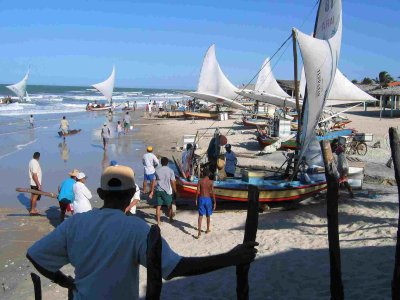 Eighty percent of Brazil´s fisheries are overexploited, with too many fishers chasing too few fish. Fishery is not a priority for the government as it represents less than 1% of GDP and generates insignificant export revenue. It is less expensive to pay fishers not to fish during closed season than to enforce management measures against illegal fishing or to spend millions for data collection and research and development. The Fishing Ministry created by President Lula has not fulfilled its promises to artisanal fishers and is on the closing list of President Dilma.
Eighty percent of Brazil´s fisheries are overexploited, with too many fishers chasing too few fish. Fishery is not a priority for the government as it represents less than 1% of GDP and generates insignificant export revenue. It is less expensive to pay fishers not to fish during closed season than to enforce management measures against illegal fishing or to spend millions for data collection and research and development. The Fishing Ministry created by President Lula has not fulfilled its promises to artisanal fishers and is on the closing list of President Dilma.
MM: What are the specific challenges in promoting sustainable living along the coast of Brazil?
RS:: The challenges are many and often interconnected, such as marine protected areas, artisanal fisher reserves with co-management, guarantee of the territory on land and sea for local populations and fisher families. Combat IUU fishing and EDUCATION, EDUCATION, EDUCATION. More and more people live in cities and do not experience nature in a very direct way. So, educating all ages about how to connect to nature, live sustainably with the sea and acquire the knowledge and skills for good jobs is paramount.
Communities and NGOs have developed alternative sanitation solutions using bio-systems and solar disinfection systems (SODIS) for clean drinking water. Communities are being empowered to look for alternative livelihoods – tourism and agro-ecology and recycling projects. Projects can easily be adapted to other regions of the country. We know from our contacts with fisher communities around the world that there are thousands of similar initiatives along the coasts of Africa, Asia and the Near East.
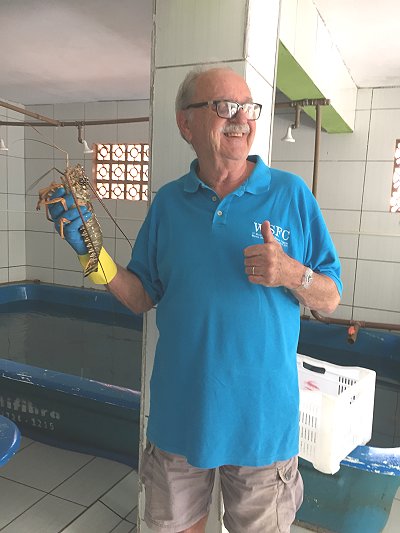 Brazil´s lobster fishery is going through its worse crises in its 60 year history. Instituto Terramar was instrumental in bringing the UNEP Project for sustainable production and consumption to Brazil in an effort to change management through the supply chain. With the support of UNEP, US importers and the Marine Stewardship Council a Fisheries Improvement Program (FIP) is under way. Unfortunately, the FIP has not been successful to curb illegal fishing, which continues at the dangerous level of 90% of operators using illegal fishing gear. According to the latest stock evaluation this could lead to the collapse of the fishery. Artisanal fishers are the first to feel the impact of IUU fishing in their catches. Besides support from Federal Government, artisanal fishers are demanding participation to guarantee their user rights and the right to participate.
Brazil´s lobster fishery is going through its worse crises in its 60 year history. Instituto Terramar was instrumental in bringing the UNEP Project for sustainable production and consumption to Brazil in an effort to change management through the supply chain. With the support of UNEP, US importers and the Marine Stewardship Council a Fisheries Improvement Program (FIP) is under way. Unfortunately, the FIP has not been successful to curb illegal fishing, which continues at the dangerous level of 90% of operators using illegal fishing gear. According to the latest stock evaluation this could lead to the collapse of the fishery. Artisanal fishers are the first to feel the impact of IUU fishing in their catches. Besides support from Federal Government, artisanal fishers are demanding participation to guarantee their user rights and the right to participate.
On the positive side, I can mention the initiative of CeDePesca, Argentina. They are working with US importers and Certificator Bureau Veritás on a verification programme for responsible fisheries using lobster traps in the community of Redonda, Icapui, in the State of Ceará. We hope that the government will recognise this initiative as one step in the right direction.
MM: What do you propose to protect the sea more effectively at global, regional and national levels?
RS: Put all the good ideas discussed in the last twenty years into practice. We believe we need Local Solutions that add up to Global Action. We don´t need to invent anything new, it is “just” a question of political will of governments and corporate business. And these “big players” need citizen engagement to make it work. So, let's prioritise law enforcement, stopping IUU fishing, denying access to port and markets of illegally caught fish.
MM: What do you think is Brazil's role in this?
RS:: In 2004, President Lula created a special Secretariat for Fisheries and in 2009 the Fisheries Ministry (MPA). Ten years later, our fisheries are in worse shape than before. The newly re-elected President Dilma Roussef used the Ministry for political bargaining, and party appointees were spending millions to increase fishing effort instead of managing the problem. With this President; with the present political crisis, the economic crisis and the incredible corruption schemes, we shouldn´t expect any bold ideas and international initiatives from Brazil. Why didn´t we elect Marina Silva as President, the former environment minister, who did much to slow deforestation of the Amazon and is a climate champion? In any event, whoever is in charge politically, we need to find workable approaches for dignified and sustainable livelihoods on the coast. The programme of co-management of some fisheries introduced in 2004 has not shown any results due to a lack of stakeholder participation and intergovernmental conflicts. Civil society organisations and fishers are now negotiating with the new Secretary of Fisheries at the MPA to guarantee participation in the decision making process.
MM: What do you think about the recent developments for ocean protection as part of the Sustainable Development goals within the post-2015 framework shortly to be adopted by the UN General Assembly?
RS:: It is a step in the right direction, but I am skeptical about making fast progress with implementing of the Sustainable Development Goals. I also have my doubts whether governments will reach any meaningful agreement in the Climate Summit in Paris in Dezember. But what I do think is necessary and feasible is to continue engaging with local constituencies the way we have done with coastal fishing communities.
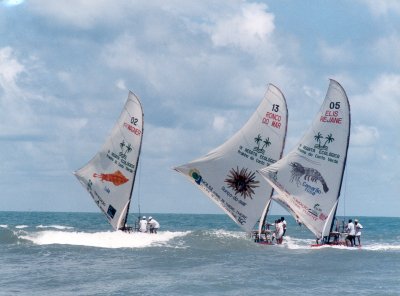 If the global political framework is positive, it can help us also at local level. I am referring to the Voluntary Guidelines for Securing Sustainable Small Scale Fisheries in the Context of Food Security and Poverty Eradication, which have been negotiated with the Fisheries Secretariat of FAO over the last 10 years and were sanctioned by FAO's Committee of Fisheries (COFI) last year (2014) in Rome. Thousands of civil society and fisher representatives of ICSF and the World Fisher Forums have contributed through workshops, Seminars and technical negotiations and produced an instrument which puts small scale fisher interests at the top of the worldwide agenda. The Global Action Plan needs to be implemented at country levels together with National Governments.
If the global political framework is positive, it can help us also at local level. I am referring to the Voluntary Guidelines for Securing Sustainable Small Scale Fisheries in the Context of Food Security and Poverty Eradication, which have been negotiated with the Fisheries Secretariat of FAO over the last 10 years and were sanctioned by FAO's Committee of Fisheries (COFI) last year (2014) in Rome. Thousands of civil society and fisher representatives of ICSF and the World Fisher Forums have contributed through workshops, Seminars and technical negotiations and produced an instrument which puts small scale fisher interests at the top of the worldwide agenda. The Global Action Plan needs to be implemented at country levels together with National Governments.
MM: Conservationists and some economists have also suggested to close off much of the high seas altogether to create sanctuaries to boost the resilience of the ocean, not only for its important food production, but its many other functions in keeping good conditions for human societies. What is your perspective from the angle of working with coastal fishermen in Brazil?
RS:: Anything which will be done to protect all natural resources in the sea and on the land is welcome and much needed for people who live from nature to prosper and continue caring for the ocean. We are already doing something at our level with coastal reserves, use of sail boats and other practices respectful of the environment. The coalition of NGOs and communities has led to many local initiatives. Two marine extractive reserves have been created in the state of Ceará since 2004. The proposal for a large marine protected area (MPA) along over 120 km of coast line has been submitted to the federal government. Slow development of management plans and lack of technicians and financial resources are hampering the development of MPAs and President Dilma Roussef has clearly shown over her first 4 year term that she is neither an environmentalist nor in favour of MPAs.
MM: What are your views about reviving maritime cultures that help us live more in harmony with nature?
RS:: That´s what we are doing every day. Right now, we are preparing a Pride Campaign in partnership with RARE to help our fishers adapt to changing circumstances without losing the pride in their culture and history. The community loves its traditions and festivals, despite internet and Whatsapp which the new generations love to use and abuse.
The young people want to stay connected to these traditions and lifestyles, but they also want to learn other things and be able to create and seize new opportunities. So, we are constantly working on a new balance between traditional ways and new demands and needs for the young people. Using the RARE principles, we train local leaders to embrace change and shape it for the benefit of their communities.
Our fishers have always used a great variety of fishing techniques and capture over 50 different species, thus they are prepared to adapt to climate change and change fishing habits without putting in jeopardy the resources.
MM: What is your greatest wish for the ocean?
RS: I wish the Ocean were the same the world over, as it still is here in Prainha do Canto Verde, come and visit to enjoy our community tourism experience.
MM:: René, thanks very much for sharing your views and inspiring experiences.








